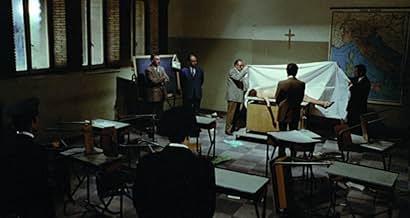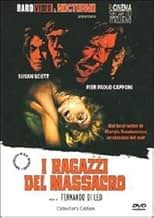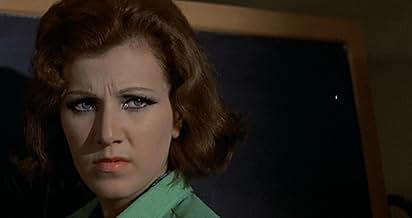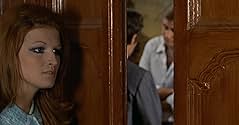Alguns jovens matam seu professor; mas não dizem sua motivação. O detetive da polícia no caso sente uma influência sinistra por trás dos jovens assassinos.Alguns jovens matam seu professor; mas não dizem sua motivação. O detetive da polícia no caso sente uma influência sinistra por trás dos jovens assassinos.Alguns jovens matam seu professor; mas não dizem sua motivação. O detetive da polícia no caso sente uma influência sinistra por trás dos jovens assassinos.
- Direção
- Roteiristas
- Artistas
Nieves Navarro
- Livia Ussaro
- (as Susan Scott)
Danika La Loggia
- Beatrice Romani
- (as Danika)
Ada Pometti
- Florist - Sorella di Verino
- (as Priscilla Benson)
Avaliações em destaque
"I ragazzi del massacro" (The Boys of the Massacre), directed by Fernando Di Leo in 1969, is a lesser-known gem of Italian crime cinema that offers a raw and unflinching look at youth delinquency and societal decay in post-war Italy. Based on the novel by Giorgio Scerbanenco, this film marks an important entry in Di Leo's filmography, showcasing his evolving style that would later define the poliziotteschi genre.
The film follows Detective Luca Lamberti, played with stoic intensity by Pier Paolo Capponi, as he investigates the brutal murder of a young teacher in a reform school. Di Leo wastes no time in establishing a grim, pessimistic tone that permeates the entire narrative. The stark black-and-white cinematography by Franco Villa accentuates the bleak urban landscapes and claustrophobic interiors, creating a palpable sense of unease and moral ambiguity.
One of the film's strengths lies in its unflinching portrayal of troubled youth. The young cast, mostly non-professional actors, deliver raw and authentic performances that lend credibility to their characters' desperate circumstances. Di Leo's direction draws out the underlying tension and barely contained violence simmering beneath the surface of these disenfranchised teenagers.
The screenplay, co-written by Di Leo and Scerbanenco, delves into themes of social inequality, institutional failure, and the cycle of violence. It presents a scathing critique of a society ill-equipped to deal with the challenges faced by its most vulnerable members. The dialogue is sharp and often brutally honest, reflecting the harsh realities of life in the urban underbelly.
Pier Paolo Capponi's portrayal of Detective Lamberti is a highlight of the film. His world-weary demeanor and dogged determination provide a moral anchor in a story filled with shades of gray. The character's interactions with the young suspects and his colleagues offer insight into the complexities of law enforcement in a changing social landscape.
The film's pacing, however, can be uneven at times. While the investigation drives the plot forward, there are moments where the narrative loses momentum, particularly in some of the more dialogue-heavy scenes. Additionally, some viewers might find the depiction of violence and social issues too bleak or dated by today's standards.
Musically, the film benefits from a haunting score by Luis Enríquez Bacalov, which enhances the atmosphere of dread and melancholy. The use of music is sparse but effective, underscoring key moments without overpowering the visual storytelling.
"I ragazzi del massacro" is notable for its place in the evolution of Italian crime cinema. It serves as a bridge between the more straightforward detective stories of the 1960s and the gritty, politically charged poliziotteschi films that would dominate the 1970s. Di Leo's directorial style, while not yet fully formed, shows glimpses of the hard-hitting approach he would perfect in later works like "Milano Calibro 9."
In conclusion, "I ragazzi del massacro" is a thought-provoking and atmospheric crime drama that offers more than just a standard whodunit. Its unflinching look at social issues and strong performances make it a worthwhile watch for fans of Italian cinema and crime fiction. While it may not reach the heights of Di Leo's later works, it remains an important and engaging entry in his filmography.
This film is recommended for viewers interested in Italian cinema history, particularly the development of the crime genre. Its stark portrayal of youth crime and societal issues may be challenging for some, but it offers valuable insights into the social climate of late 1960s Italy. As with many films of its era, some aspects may feel dated, but its core themes and atmospheric storytelling continue to resonate. 🇮🇹🔍
The film follows Detective Luca Lamberti, played with stoic intensity by Pier Paolo Capponi, as he investigates the brutal murder of a young teacher in a reform school. Di Leo wastes no time in establishing a grim, pessimistic tone that permeates the entire narrative. The stark black-and-white cinematography by Franco Villa accentuates the bleak urban landscapes and claustrophobic interiors, creating a palpable sense of unease and moral ambiguity.
One of the film's strengths lies in its unflinching portrayal of troubled youth. The young cast, mostly non-professional actors, deliver raw and authentic performances that lend credibility to their characters' desperate circumstances. Di Leo's direction draws out the underlying tension and barely contained violence simmering beneath the surface of these disenfranchised teenagers.
The screenplay, co-written by Di Leo and Scerbanenco, delves into themes of social inequality, institutional failure, and the cycle of violence. It presents a scathing critique of a society ill-equipped to deal with the challenges faced by its most vulnerable members. The dialogue is sharp and often brutally honest, reflecting the harsh realities of life in the urban underbelly.
Pier Paolo Capponi's portrayal of Detective Lamberti is a highlight of the film. His world-weary demeanor and dogged determination provide a moral anchor in a story filled with shades of gray. The character's interactions with the young suspects and his colleagues offer insight into the complexities of law enforcement in a changing social landscape.
The film's pacing, however, can be uneven at times. While the investigation drives the plot forward, there are moments where the narrative loses momentum, particularly in some of the more dialogue-heavy scenes. Additionally, some viewers might find the depiction of violence and social issues too bleak or dated by today's standards.
Musically, the film benefits from a haunting score by Luis Enríquez Bacalov, which enhances the atmosphere of dread and melancholy. The use of music is sparse but effective, underscoring key moments without overpowering the visual storytelling.
"I ragazzi del massacro" is notable for its place in the evolution of Italian crime cinema. It serves as a bridge between the more straightforward detective stories of the 1960s and the gritty, politically charged poliziotteschi films that would dominate the 1970s. Di Leo's directorial style, while not yet fully formed, shows glimpses of the hard-hitting approach he would perfect in later works like "Milano Calibro 9."
In conclusion, "I ragazzi del massacro" is a thought-provoking and atmospheric crime drama that offers more than just a standard whodunit. Its unflinching look at social issues and strong performances make it a worthwhile watch for fans of Italian cinema and crime fiction. While it may not reach the heights of Di Leo's later works, it remains an important and engaging entry in his filmography.
This film is recommended for viewers interested in Italian cinema history, particularly the development of the crime genre. Its stark portrayal of youth crime and societal issues may be challenging for some, but it offers valuable insights into the social climate of late 1960s Italy. As with many films of its era, some aspects may feel dated, but its core themes and atmospheric storytelling continue to resonate. 🇮🇹🔍
The teacher of an evening school for youngsters with social problems is brutally raped and murdered right in her classroom. The only suspects are on the kids of course and the police is surprised to find them all quietly in their homes instead of having escaped. There is a reason. Each kid declares that he did not participate in the brutality but was forced to watch. The police officer Lamberti has reasons to believe that someone, an adult, has orchestrated the kids which are afraid to even mention this person. It will not be an easy case.
Fernando Di Leo takes us for this incredible trip among juvenile delinquency. Although the movie was made in 1969, Di Leo talks about drugs, veneral diseases, prostitution, transvestism, teenagers having sex with old women, homosexuality and incest much in advance compared to what still had to come in our society.
Fernando Di Leo delivers us a very interesting movie technically superb. The interrogation of the youngsters is done in a very sharp style. The rape scene, although very impressive, is simply done with a camera movement. The suspense is well built. Pier Paolo Capponi offers us an excellent interpretation. With him we have Livia Ussaro more interested in the social aspects of the youngsters: "The police doesn't care about the kids, who they are, what they wanted to be, what they do and why they do it, if they have feelings. They are considered criminals and that's all..." But for inspector Lamberti these words will not remain unheard. To solve the case he will also have to consider these aspects.
Fernando Di Leo. One of Italy's most interesting directors.
Fernando Di Leo takes us for this incredible trip among juvenile delinquency. Although the movie was made in 1969, Di Leo talks about drugs, veneral diseases, prostitution, transvestism, teenagers having sex with old women, homosexuality and incest much in advance compared to what still had to come in our society.
Fernando Di Leo delivers us a very interesting movie technically superb. The interrogation of the youngsters is done in a very sharp style. The rape scene, although very impressive, is simply done with a camera movement. The suspense is well built. Pier Paolo Capponi offers us an excellent interpretation. With him we have Livia Ussaro more interested in the social aspects of the youngsters: "The police doesn't care about the kids, who they are, what they wanted to be, what they do and why they do it, if they have feelings. They are considered criminals and that's all..." But for inspector Lamberti these words will not remain unheard. To solve the case he will also have to consider these aspects.
Fernando Di Leo. One of Italy's most interesting directors.
"I Ragazzi del Massacro" tells the story of the brutal rape and murder of a female teacher by the students in a classroom. The opening scene shows the teacher, the classroom and the students. There's no other sound beside the ominous soundtrack. She's is writing something on the blackboard and then we see the faces of the students. They don't seem about to start singing "To Sir with Love". We see their faces in close-up, the apprehensive look of the teacher. The scene builds to a crescendo till her rape and murder - this is not shown graphically but rather in an elliptical way. We see faces, pieces of flesh, her being undressed, the students crowding her.. Cut! In the next shot her dead body is lying naked and defenseless - it is surrounded by policemen. An investigation is about to begin.
The police detective Marco Lamberti (Pier Paolo Capponi) has to interrogate the students of the classroom to know the who, how and why. The students of this school are from the lower classes, come from reformatories, live lives in which poverty and violence are their daily companions. But police detective Lamberti is indignant - all he wishes is to crack some heads. Curiously, after the rape & murder scene, I myself was so full of anger that I felt in sympathy with the cop's indignation. It's funny! On seeing a film, I'm not the one who roots for the cops. Especially if there's a lot of finger wagging and preachiness. But "I Ragazzi del Massacro" doesn't follow the easy way - the crime is shown in all its hideousness, but we are given also brief glimpses into the lives of those students - illness, violence, hopelessness...
Lamberti has to find out who started the thing, and he can't lay a finger on the students - they are under age, and Italy, after all, is a democracy.
Lamberti is teamed up with a social worker, Livia (Nieves Navarro/Susan Scott). Justice and compassion work hand in hand to find out what happened. But make no mistake. This is not a political film in the strictest sense of the word - it's just a crime flick with a social consciousness.
What is remarkable is the honesty and crudity of "I Ragazzi del Massacro". This was very rare at the time. And even now, if the same story were told by Hollywood, it would be transformed into the usual tear-jerker - the tears would be followed by revenge and crowned by beautiful moral lessons.
The acting overall is very good - the tough but sensitive Lamberti (Pier Paolo Capponi), the students, the lovely Susan Scott as the social worker etc.. The soundtrack is a gem, it is scary and ominous without being too flashy. The story is well told and there are many surprises in store - it's not a predictable film at all! The film hooked me from the beginning to the end.
What are you waiting for? See this film if you can.
The police detective Marco Lamberti (Pier Paolo Capponi) has to interrogate the students of the classroom to know the who, how and why. The students of this school are from the lower classes, come from reformatories, live lives in which poverty and violence are their daily companions. But police detective Lamberti is indignant - all he wishes is to crack some heads. Curiously, after the rape & murder scene, I myself was so full of anger that I felt in sympathy with the cop's indignation. It's funny! On seeing a film, I'm not the one who roots for the cops. Especially if there's a lot of finger wagging and preachiness. But "I Ragazzi del Massacro" doesn't follow the easy way - the crime is shown in all its hideousness, but we are given also brief glimpses into the lives of those students - illness, violence, hopelessness...
Lamberti has to find out who started the thing, and he can't lay a finger on the students - they are under age, and Italy, after all, is a democracy.
Lamberti is teamed up with a social worker, Livia (Nieves Navarro/Susan Scott). Justice and compassion work hand in hand to find out what happened. But make no mistake. This is not a political film in the strictest sense of the word - it's just a crime flick with a social consciousness.
What is remarkable is the honesty and crudity of "I Ragazzi del Massacro". This was very rare at the time. And even now, if the same story were told by Hollywood, it would be transformed into the usual tear-jerker - the tears would be followed by revenge and crowned by beautiful moral lessons.
The acting overall is very good - the tough but sensitive Lamberti (Pier Paolo Capponi), the students, the lovely Susan Scott as the social worker etc.. The soundtrack is a gem, it is scary and ominous without being too flashy. The story is well told and there are many surprises in store - it's not a predictable film at all! The film hooked me from the beginning to the end.
What are you waiting for? See this film if you can.
Naked Violence is yet another well made and effective offering from Fernando Di Leo; a director that often doesn't receive the praise he deserves. Di Leo would go on to make some of the best Italian crime films in the early to mid seventies, but he also made some interesting stuff in other genres; such as this film. The film is based on a novel by Ulkranian writer Giorgio Scerbanenco, who also wrote books that inspired other Di Leo films. The film is very concise and the director is keen to focus on the important elements of the plot, which helps the film to keep focus and in turn makes it more interesting. The film begins with a scene that sees a young schoolteacher raped and murdered by her class; which just happens to be full of delinquents high on alcohol. Police Inspector Liberti gets on the case and begins by interrogating the kids in the class, but as he continues his investigation; he realises that it's becoming less and less likely that the kids acted on their own accord, and his suspicions are confirmed when his best witness is found dead.
The film is essentially a character study and we mainly focus on the Police Inspector and a handful of the boys at the centre of the crime. The locations used are not particularly diverse; especially not during the first third when almost everything takes place inside a room in the police station. The film does have a very minimalist approach, but it's all done very professionally and the film is of a higher quality than a lot of the output from Italy in the late sixties and early seventies. The film is bolstered by a handful of good acting performances; Pier Paolo Capponi is absolutely great as the police inspector and receives good support from Giallo heroine Susan Scott (who in truth doesn't have a whole lot to do) and Giuliano Manetti as the main character of the school class. The majority of the film is build-up as we try to work out the reasons behind the heinous crime at the start of the film; and the brutal climax doesn't disappoint. The motive for the killings might not go down too well in some circles; but it's inventive enough and ensures that the film finishes well. Overall, this is an excellent thriller and comes highly recommended!
The film is essentially a character study and we mainly focus on the Police Inspector and a handful of the boys at the centre of the crime. The locations used are not particularly diverse; especially not during the first third when almost everything takes place inside a room in the police station. The film does have a very minimalist approach, but it's all done very professionally and the film is of a higher quality than a lot of the output from Italy in the late sixties and early seventies. The film is bolstered by a handful of good acting performances; Pier Paolo Capponi is absolutely great as the police inspector and receives good support from Giallo heroine Susan Scott (who in truth doesn't have a whole lot to do) and Giuliano Manetti as the main character of the school class. The majority of the film is build-up as we try to work out the reasons behind the heinous crime at the start of the film; and the brutal climax doesn't disappoint. The motive for the killings might not go down too well in some circles; but it's inventive enough and ensures that the film finishes well. Overall, this is an excellent thriller and comes highly recommended!
Another masterpiece I'll remember, the flashbacks in the movie were done really, well. I don't thinlk the story was that good, but DiLeo once again made it into a masterpiece. After any of his movies I seriously can't watch anything else, he's to good. I'm seriously thinking of leaving my Job and becoming a director, and try to continue his legacy. This film, agan is based on the milano of the late 60s, when no one in Italy made real movies about outsider kids, but he dug deep and, as always made a masterpiece
Você sabia?
- CuriosidadesDuca chain smokes fashionable Astor cigarettes.
- Erros de gravaçãoThe soft, feminine hands of the instigator of the crimes develop hair on them during the rape.
- Citações
Duca Lamberti: Fiorello Grassi's a pederast.
- ConexõesFeatured in Italian Gangsters (2015)
Principais escolhas
Faça login para avaliar e ver a lista de recomendações personalizadas
- How long is Naked Violence?Fornecido pela Alexa
Detalhes
- Tempo de duração1 hora 32 minutos
- Cor
- Proporção
- 1.85 : 1
Contribua para esta página
Sugerir uma alteração ou adicionar conteúdo ausente

Principal brecha
By what name was I ragazzi del massacro (1969) officially released in India in English?
Responda




















